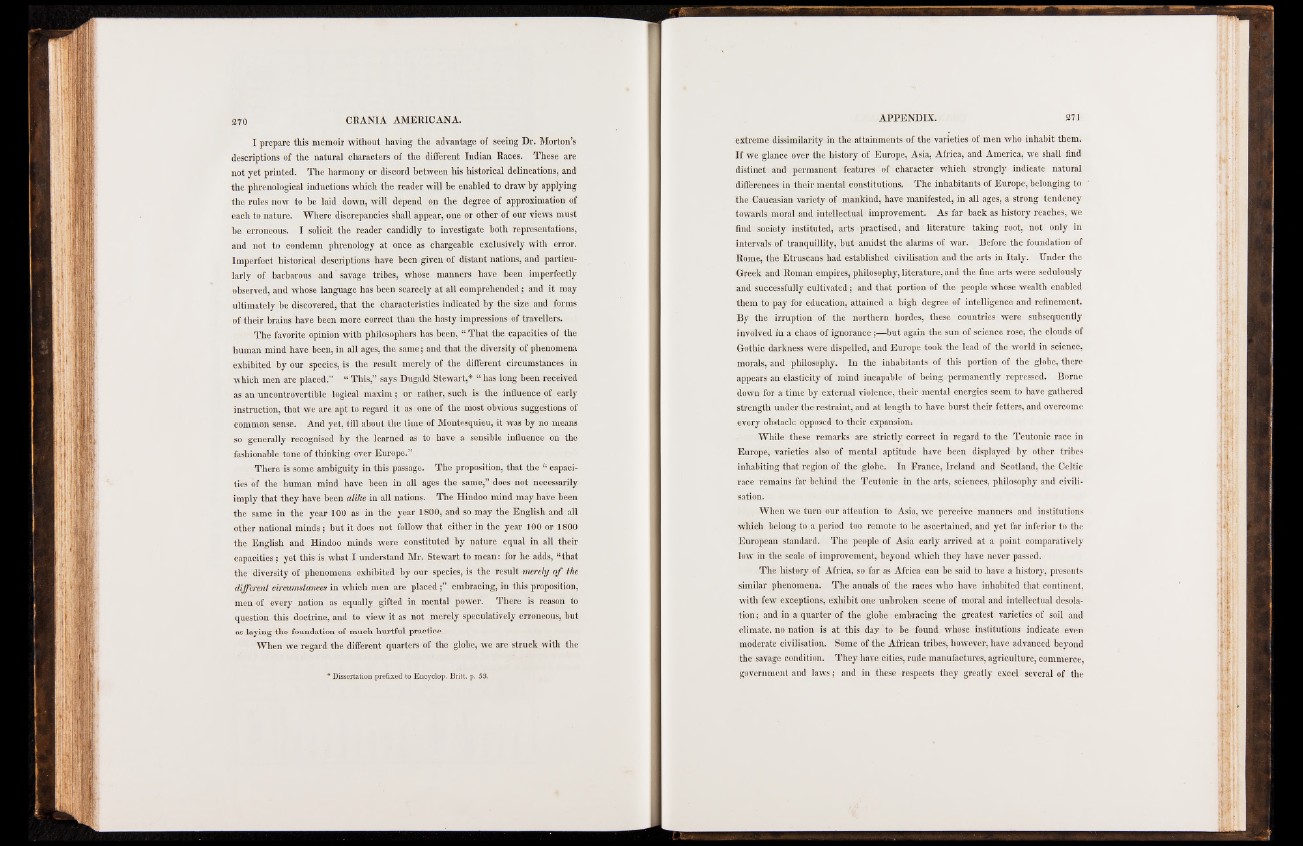
I prepare this memoir without haring the advantage of seeing Dr. Morton’s
descriptions of the natural characters of the different Indian Races. These are
not yet printed. The harmony or discord between his historical delineations, and
the phrenological inductions which the reader will be enabled to draw by applying
the rules now to he laid down, will depend on the degree of approximation of
each to nature. Where discrepancies shall appear, one or other of our views must
he erroneous. I solicit the reader candidly to investigate both representations,
and not to condemn phrenology at once as chargeable exclusively with error.
Imperfect historical descriptions have been giveii. of distant nations, and particularly
of barbarous and savage tribes, whose manners have been imperfectly
observed, and whose language has been scarcely at all comprehended ; and it may
ultimately be discovered, that the characteristics indicated by the size and forms
of their brains have been more correct than the hasty impressions of travellers.
The favorite opinion with philosophers has been, “ That the capacities of the
human mind have been, in all ages, the same; and that the diversity of phenomena
exhibited by our species, is the result merely of the different circumstances in
which men are placed.” “ This,” says Dugald Stewart,* “ has long been received
as an uncontrovertible -logical maxim ; or rather, such is the influence of early
instruction, that we are apt to regard it as one of the most obvious suggestions of
common sense. And yet, till about the time of Montesquieu, it was by no means
so generally recognised by the learned as to hâve a sensible influence on the
fashionable tone of thinking over Europe.”
There is some ambiguity in this passage. The proposition, that the “ capacities
of the human mind have been in all ages the same,” does not necessarily
imply that they have been alike in all nations. The Hindoo mind may have been
the same in the year 100 as in the year 1800, and so may the English, and all
other national minds; hut it does not follow that either in the year 100 or 1800
the English and Hindoo , minds were constituted by nature equal in all their
capacities ; yet this is what I understand Mr. Stewart to mean: for he adds, “that
the diversity of phenomena exhibited by our species, is the result merely o f the
different eireumstanees in which men are placed ;” embracing, in this proposition,
men of every nation as equally gifted in mental power. There is reason to
question this doctrine, and to view it as not merely speculatively erroneous, hut
as laying the foundation of much hurtful practice.
When we regard the different quarters of the globe, we are struck with the
Dissertation prefixed to Encyclop. Britt, p. 53.
extreme dissimilarity in the attainments of the varieties of men who inhabit them.
If we glance over the history of Europe, Asia, Africa, and America, we shall find
distinct and permanent features of character which strongly indicate natural
differences in their mental constitutions. The inhabitants of Europe, belonging to
the Caucasian variety of mankind, have manifested, in all ages, a strong tendency
towards moral and intellectual improvement. As far hack as history reaches, we
find society instituted, arts practised, and literature taking root, not only in
intervals of tranquillity, hut amidst the alarms of war. Before the foundation of
Rome, the Etruscans had established civilisation and the arts in Italy. Under the
Greek and Roman empires, philosophy, literature, and the fine arts were sedulously
and successfully cultivated ; and that portion of the people whose wealth enabled
them to pay for education, attained a high degree of intelligence and refinement.
By the irruption of the northern hordes, these countries were subsequently
involved in a chaos of ignorance but again the sun of science rose, the clouds of
Gothic darkness were dispelled, and Europe took the lead of the world in science,
morals, and philosophy. In the inhabitants of this portion of the globe, there
appears an elasticity of mind incapable of being permanently repressed. Borne
down for a time by external violence, their mental energies seem to have gathered
strength under the restraint, and at length to have burst their fetters, and overcome
every obstacle opposed to their expansion.
While these remarks are strictly correct in regard to the Teutonic race in
Europe, varieties also of mental aptitude have been displayed by other tribes
inhabiting that region of the globe. In France, Ireland and Scotland, the Celtic
race remains far behind the Teutonic in the arts, sciences, philosophy and civilisation.
When we turn our attention to Asia, we perceive manners and institutions
which belong to a period too remote to be ascertained, and yet far inferior to the
European standard. The people of Asia early arrived at a point comparatively
low in the scale of improvement, beyond which they have never passed.
The history of Africa, so far as Africa can be said to have a history, presents
similar phenomena. The annals of the races who have inhabited that continent,
with few exceptions, exhibit one unbroken scene of moral and intellectual desolation;
and in a quarter of the globe embracing the greatest varieties of soil and
climate, no nation is at this day to be found whose institutions indicate even
moderate civilisation. Some of the African tribes, however, have advanced beyond
the savage condition. They have cities, rude manufactures, agriculture, commerce,
government and laws ; and in these respects they greatly excel several of the